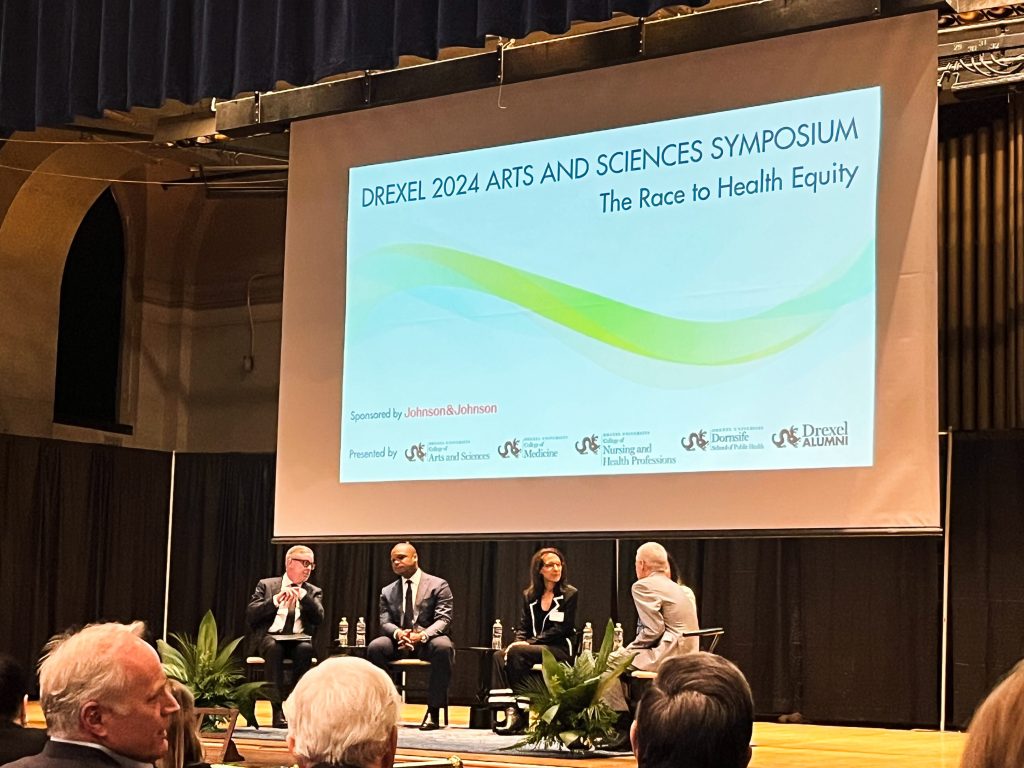
Drexel University’s College of Arts and Sciences recently instituted an annual series of Arts and Sciences Symposiums. The inaugural event, “Race to Health Equity,” brought together key leaders in Drexel’s fight for health equity in Philadelphia, and the global efforts of Johnson and Johnson (J&J). Eight speakers took the stage over a span of three hours Wednesday afternoon for a community health panel and keynote event. Speakers discussed a variety of issues including their individual efforts in the area of health equity and company-wide initiatives in the case of J&J. The event was a joint effort between the College of Arts and Sciences, Medicine, Nursing and Health Professions and Dornsife School of Public Health.
The first segment was an hour-long faculty panel moderated by Dr. Veronica D. Carey and featuring Senior Associate Dean for the College of Medicine’s Office of Community Health Dr. Annette Gadegbeku, College of Arts and Sciences faculty Dr. Naomi Goldstein and College of Nursing and Health Professions faculty Monica Harmon and Judy Ensslin. The event focused primarily on the community health interventions conducted by each of the speakers to different degrees in a variety of fields.
Gadegbeku started off by describing the mini courses that the College of Medicine has started to offer at the Science Leadership Academy Middle School housed next to the Health Sciences Building. Drexel students, faculty and staff discuss topics related to health sciences in order to provide young students with the opportunity to learn how to care for themselves and learn more about health professional jobs and opportunities early on. “If they can’t see it, they can’t be it,” said Gadegbeku, emphasizing the importance of making opportunities both available and visible to local community members to create a more diversified healthcare workforce.
Harmon, the executive director of the Community Wellness Hub, emphasized the importance of building trust and being consistently physically present with community members as the only real way to increase attendance and engagement at community health events and educational opportunities, an issue which many health educators struggle with. These key points tied back to the overarching theme of ensuring that all members of the community are provided with equity in opportunities for professional development and personal growth.
Goldstein described her efforts to rework the juvenile justice system throughout Powelton Village and Mantua at a systemic level. As Director of the Juvenile Justice Research and Reform (JJR&R) Lab at Drexel, Goldstein described that students previously processed in the system struggle with housing, benefits and education throughout their life. The solutions to these issues range from preventing students from being placed in the system in the first place, minimizing their time in the probationary and justice system, and providing services supporting health and health equity following their release. The focus of her lab is partnering with police departments to change policies and diverting students to community-based services. Ensuring that students who made a mistake in their youth are not heavily impacted throughout the rest of their life is key, she emphasized.
Ensslin, the Director of Drexel’s PA SNAP-Ed/Eat Right Philly program, focuses on food insecurity and food access and education in Philadelphia. Partnering with the School District of Philadelphia and local food organizations, Eat Right Philly provides educational opportunities and personnel to assist in distributing food to high school students and community members.
In response to a question regarding the most frustrating aspect of working with health equity and social determinants of health, speakers emphasized the present awareness around the social determinants themselves with an actual lack of initiatives addressing them. Additionally, in the case of juvenile justice reform, implicit bias and subjective decision-making leads to disproportionate success of interventions on white individuals rather than minorities.
Following the initial faculty panel, the second “Leadership experts panel” event moderated by Drexel President John Fry included key J&J executives like Chairman and CEO Joaquin Duato, U.S. Patient Engagement Strategy Leader Danielle DeFeo, Vice President Head of Cross Therapeutic Area Delivery Unit Dr. Michelle Kramer and Global Head of Global Health Equity Howard Reid. This event, which primarily focused on the recent development and goals of J&J rather than the health equity focus of the previous session, also included two Drexel graduates, DeFeo and Kramer.
To start, Duato described the recent changes of J&J, including transforming into a medical innovation service last year. “The progress of the medical field is in its golden era,” he said, emphasizing how recent advancements in technology and medicine have provided the opportunity for analyzing large quantities of data and advances in drug development and discovery like never before. Cancer in particular, he emphasized, is being tackled like never before with the cell and gene therapy innovation occurring around through J&J.
Reid, whose primary focus is eliminating health inequities for the betterment of humanity at J&J, described his process of both defining health and outlining the most important issues to tackle in health equity and wellness.The principle that “Health is a human right”is key to ensuring health equity, he emphasized. One of his goals, to eliminate health inequalities for people of color, was something he aligned to the J&J innovation with pharmaceuticals. Focusing on large-scale impacts while aiming for deep health equality, Reid describes how operations and business are key locations to implement such initiatives. Kramer and DeFeo reflected similar ideas. DeFeo specifically works with the HIV and LGBTQIA+ communities and other marginalized communities. Humanity and health communication is key, she emphasized.
Ending off the event, all speakers emphasized that “healthcare is lifelong learning,” and should be treated as such, and urged students to take chances and try new things to potentially end up in unexpected places.


